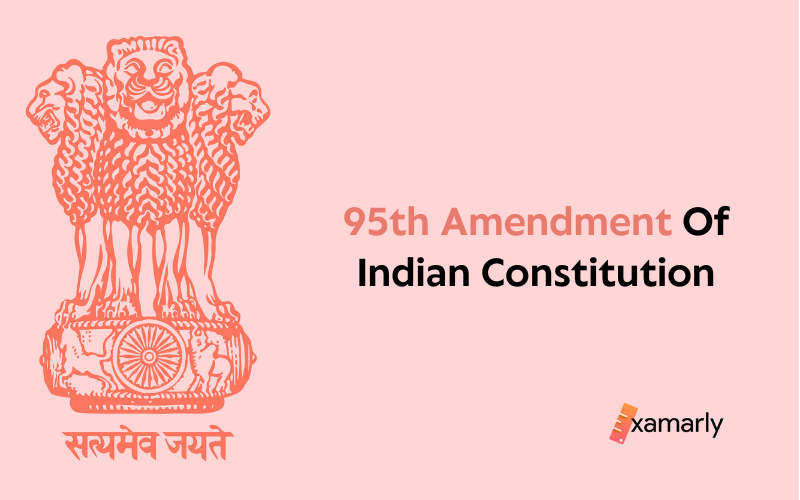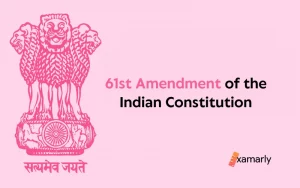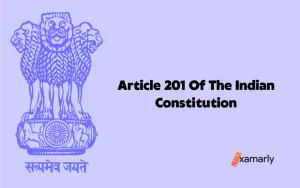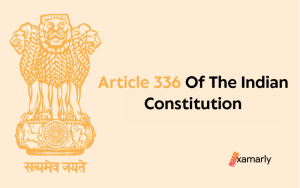The 95th Amendment of Indian Constitution has been approved by the Indian Parliament. The bill has been passed unanimously in both Lok Sabha and Rajya Sabha. It received the assent of President Pratibha Patil on 18th January 2010. It was notified in the Gazette of India on the same day. It came into effect on 25th January 2010.
- Background
- Date Enacted
- Salient Features And Facts
- Statement Of Objects And Reasons
- Prominent People Involved
- Important Provisions Under 95th Amendment Of Indian Constitution
- Ratification
- Summing Up
- FAQ's
- Which amendment extended the seats of reservation for the SCs, STs, and Anglo-Indian community in 2009?
- What is another name for the 95th Amendment of Indian constitution?
- 95th Amendment Act came into force on which date?
- Who was the President of India, at the time of the 95th Amendment?
- Who played the important role in the 95th Amendment Act?
Background
The Ninety-fifth Amendment is based on Article 334 of the Indian Constitution which concerns the reservation policy of the Indian Constitution. The reservation of seats for deprived classes, namely SC and ST, and the Anglo Indian community in the House of Parliament was expanded to 1970 by the 8th Amendment while Article 334 required the reservation of seats to be discontinued in 1960.
The period of reservation was expanded to 1980 by the 23rd amendment, to 1990, 2000, and 2010 by the 45th, 62nd, and 79th amendments.
Date Enacted
This act was passed by Rajya Sabha on 3rd August 2009, by Lok Sabha on 4th August 2009, and received assent from President on 18th January 2010. And finally, it came into effect on 25th January 2010.
Salient Features And Facts
The 95th Amendment of Indian Constitution has introduced various changes to the Indian constitution.
1. This act may be called the Constitution Act, 2009.
2. It extended the reservation of seats for SCs and STs in lok sabha and state legislative assemblies by a period of ten years (Vidhan Sabha).
3. It also extended the Anglo-Indians reservation of seats (by nomination) in Lok Sabha and state legislative assemblies (Vidhan Sabha, not in union territories).
4. It replaced the words “sixty years” with the words “seventy years” in article 334.
5. It ensured adequate representation of SCs, STs and Anglo-Indians, helping in protection of their civil liberties. It also ensured special protection of these communities by vesting parliamentary legislative power on their representatives.
6. It grants adequate provision for Article 46 of the Constitution which says that the states shall work towards the educational and economic welfare of the deprived classes in society. Thus, constitutional protection towards these classes is enforced.
7. The constitutional amendment procedure involved a special majority vote since it concerned changing the basic structure of Constitution according to Article 368. This special majority vote comprised simple majority from both the upper and lower house of parliament, and ratification of the states.
Related – 62nd Amendment Of Indian Constitution
Statement Of Objects And Reasons
The Statement Of Objects And Reasons for the 95th Amendment of Indian Constitution is not a complete statement of the objective of the new constitution. However, it is a step in the right direction. It provides a more readable explanation of the statutory purpose. The Statement justifies the extension of the period of reservation of seats for SCs and STs in lok sabha and state legislative assemblies( Vidhan Sabha, not in the union territories) but does not justify the extension for Anglo-Indian communities.
The stipulations in the 95th Amendment of Indian constitution are aimed at ensuring equality in the country, irrespective of ethnicity, caste, or religion. Although progress has been made for Scheduled Castes and Tribes in the past seven decades, the factors that influenced the Constituent Assembly’s decision then are still relevant in the present times and are likely to continue to exist in India.
The parliamentary legislative power which would be vested upon the representatives of Scheduled Castes and Scheduled Tribes sought to constitutional protection and adequate representation of these classes.
Prominent People Involved
Two prominent people were involved in this. The one was M.Veerappa Moily who was the Minister of Law and Justice at that time and the second one is Mrs.Pratibha Patil who was the President of India at that time.
M.Veerappa Moily introduced the bill of the Constitution Act, 2009 in the Rajya Sabha on 30th July 2009 as the Constitution Bill, 2009. The bill was passed with a special majority vote according to article 368, because the bill attempted for a Constitutional amendment, and advocated changes in the basic structure of the constitution. A simple majority from lok sabha and Rajya sabha had to be coupled with ratification of the states. This involved the participation of Vidhan Sabha. The bill then received assent from the President on 18th January 2010 and was made into an Act.
Important Provisions Under 95th Amendment Of Indian Constitution
These are some important constitutional provisions in favour of the upliftment of scheduled sections of the society (SCs and STs):-
•Article 366: This article defines an Anglo-Indian. An Anglo-Indian is a person whose father or any of whose other male ancestor is or was of European descent but who is domiciled within the territory of India and is or was born within such territory of parents habitually resident therein and not established there for temporary purposes only.
- Article 331: This article said that if the Anglo-Indian community is not properly portrayed, two members of the community can be recommended by the President to the Lok Sabha.
- Article 333: It states that if the Governor believes that the Anglo-Indians needs representation in the State Legislative Assembly and Anglo-Indian representation is not properly depicted therein, he can recommend one member of the community to the assembly.
- Article 334(b): This article introduced the extension for 40 years in 1949 of the reservation of the Anglo- Indian community in the Legislative bodies.
- Article 338: This article was amended in 2003 by 89th Constitutional Amendment. It produced two separate constitutional bodies, National Commission for Scheduled Castes and National Commission for Scheduled Tribes. National commission for scheduled castes and National commission for Scheduled Tribes examine and supervise all matters related to the Constitutional and other legal safeguards for SCs, STs, respectively, and additionally the Anglo-Indian community. These National Commissions reports their work to the President.
- Article 243D: This article is based on reservation of the deprived sections of the society in Panchayati Raj. It states that the offices of the chairpersons in the panchayats of the village or any other level shall be reserved for SCs, STs and women as the legislature of a state may provide, in accordance with the population of SCs and STs in proportion to the population of the whole state.
Ratification
This act of Parliament, after having ratified by the legislative assemblies of not less than one-half of the state by resolutions to that effect, received the assent of the President on the 18th of January 2010, and then published in the Gazette of India. It was enacted by Parliament House in the sixtieth year of the Republic of India.
Summing Up
Article 334 demonstrates the provisions of the Constitution related to the reservation of the seats in the legislative assembly (Vidhan Sabha) for the SCs, STs, and Anglo-Indian communities.
So, 95th Amendment Act made major changes. It extended the aforesaid reservation policy in Indian Union and the state legislative assemblies for SCs, STs, and reservation of elections for the Anglo-Indian Communities for 10 years and maintained the erstwhile representation. The bill was passed by both Lok Sabha and Rajya Sabha and received assent from the President. And this was published in the Gazette of India on 18th January 2010.
This is one of the major amendment acts. This comprehensive amendment provided special provisions to backward classes (deprived classes).
Like this, 77th Amendment Act provided for Reservation in Promotion of SCs, and STs in government jobs. It relates to promotions in government jobs.
Important Amendments In the Constitution of India
10th Amendment Act, 1961 incorporated Dadra and Nagar Haveli as a Union Territory by amending the 1st schedule.
19th Amendment Act, 1966 declared abolishment of System of Election Tribunals and High Courts were provided the power to hear the election petitions.
21st Amendment Act, 1967 included the Sindhi language in the 8th schedule of the Constitution.
42nd Amendment Act shifted five subjects to the concurrent list from the state list. These subjects are- Education, Wildlife& bird protection, Forests, Administration of Justice, Weight, and measure.
80th Amendment Act, 2000 introduced a new way of distribution of taxes between the Union and the States.
85th Amendment Act, 2001 provided for ‘consequential seniority’ in the case of promotion by virtue of the rule of reservation for the government servants belonging to the SCs, and STs.
See Also – Anglo-Indian reserved seats in the Lok Sabha
FAQ’s
Which amendment extended the seats of reservation for the SCs, STs, and Anglo-Indian community in 2009?
95th of the Indian Constitution.
What is another name for the 95th Amendment of Indian constitution?
The Constitution Act, 2009.
95th Amendment Act came into force on which date?
On 25th January 2010.
Who was the President of India, at the time of the 95th Amendment?
Mrs.Pratibha Patil
Who played the important role in the 95th Amendment Act?
Mr. M.Veerappa Moily and Mrs. Pratibha Patil






